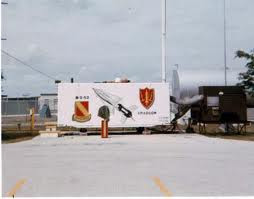 |
| Nike Ajax at White Sands |
The battery commander, Capt. Earnest Tietke, was elated and wanted to give the battery personnel and their dependents a special Thanksgiving. He arranged for the mess hall to prepare a lavish turkey dinner for the men with special attention to the families of the career soldiers in our unit. Most of us were draftees who were not married and had no dependents. Our battery happened to be on full alert that Thanksgiving Day. The four batteries in the missile battalion were on full alert on a rotating basis, which meant that men were on the equipment and could fire missiles within five minutes of receiving a prepare to fire command.
 | |
| The launching control console where I ate Thanksgiving dinner. |
 |
| This is the kind of van in which I had Thanksgiving dinner |
Two of the cooks for our mess hall were draftees, also. One of them was a baker and pastry chef from Brooklyn. The other was a man whose family ran a restaurant. They both were using their Army experience to hone their professional skills. The baker had made an arrangement for the mess hall to get flour, yeast, and fresh eggs instead of the bread and powdered eggs that were shipped in. He made fresh bread every day. The other man, who had supervised the roasting of the turkeys and the preparation of the Thanksgiving dinner, was always trying something different for the troops. When we had German-American Day once when Germans were invited onto the post, he barbecued an entire beef. Both of the men were convinced that good, carefully prepared food was essential to the morale of the troops, particularly at an isolated post such as ours.
Eventually a runner from the orderly room showed up at the launching area gate with some mess trays wrapped in towels. He said here is your dinner. The cooks had heated up some left-over roast beef, put it on some of that fresh-baked bread, and covered it with gravy. It was probably the best hot beef sandwich I ever had. They included cranberry sauce which they had cooked, a big plate of pickles and other relishes, and a thermos of freshly made coffee.
I may have been forgotten out there in the launching area, but the special effort of those cooks was something for which I was very thankful. That meal on that Thanksgiving is one of the warmest memories I have of that outpost on the Rhine.
A side note: As I said the cooks had arranged to get fresh eggs instead of powdered ones. Sometimes they had more than they could use, so they hard boiled them and pickled them, and sent them over to the enlisted men's club for the men to have something to go with their beer. This was also a special treat to the men, who quickly devoured them. However, beer and pickled eggs create certain gastric conditions in the human which can make a squad room where 24 men sleep a hazard area. What is hazardous is the struggle between those who open the windows and those who shut them because they get cold. You can imagine the circumstances for yourselves.

No comments:
Post a Comment